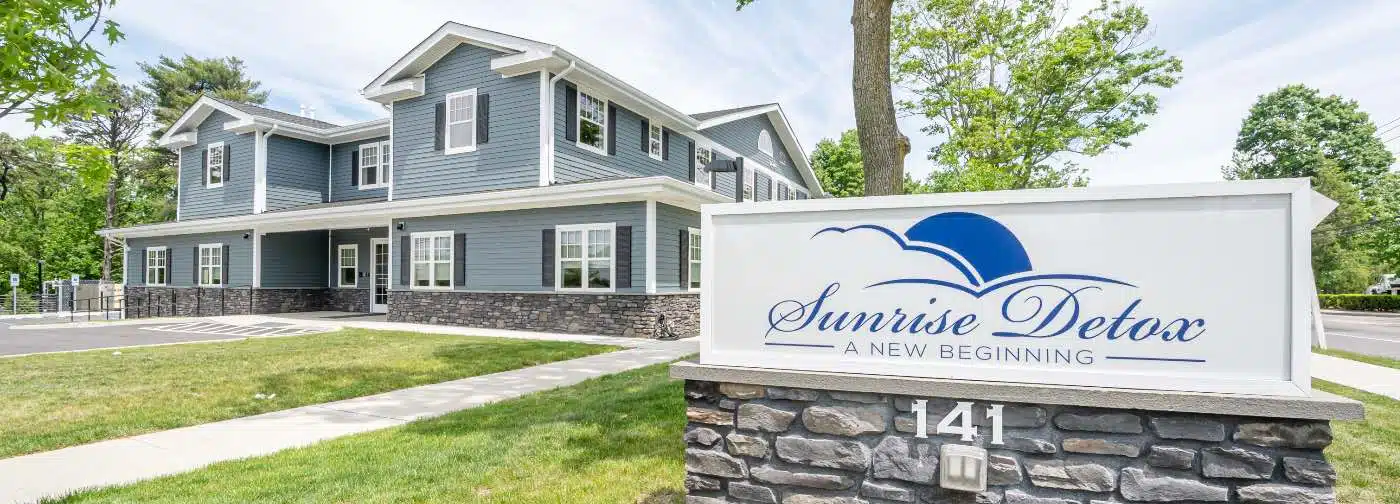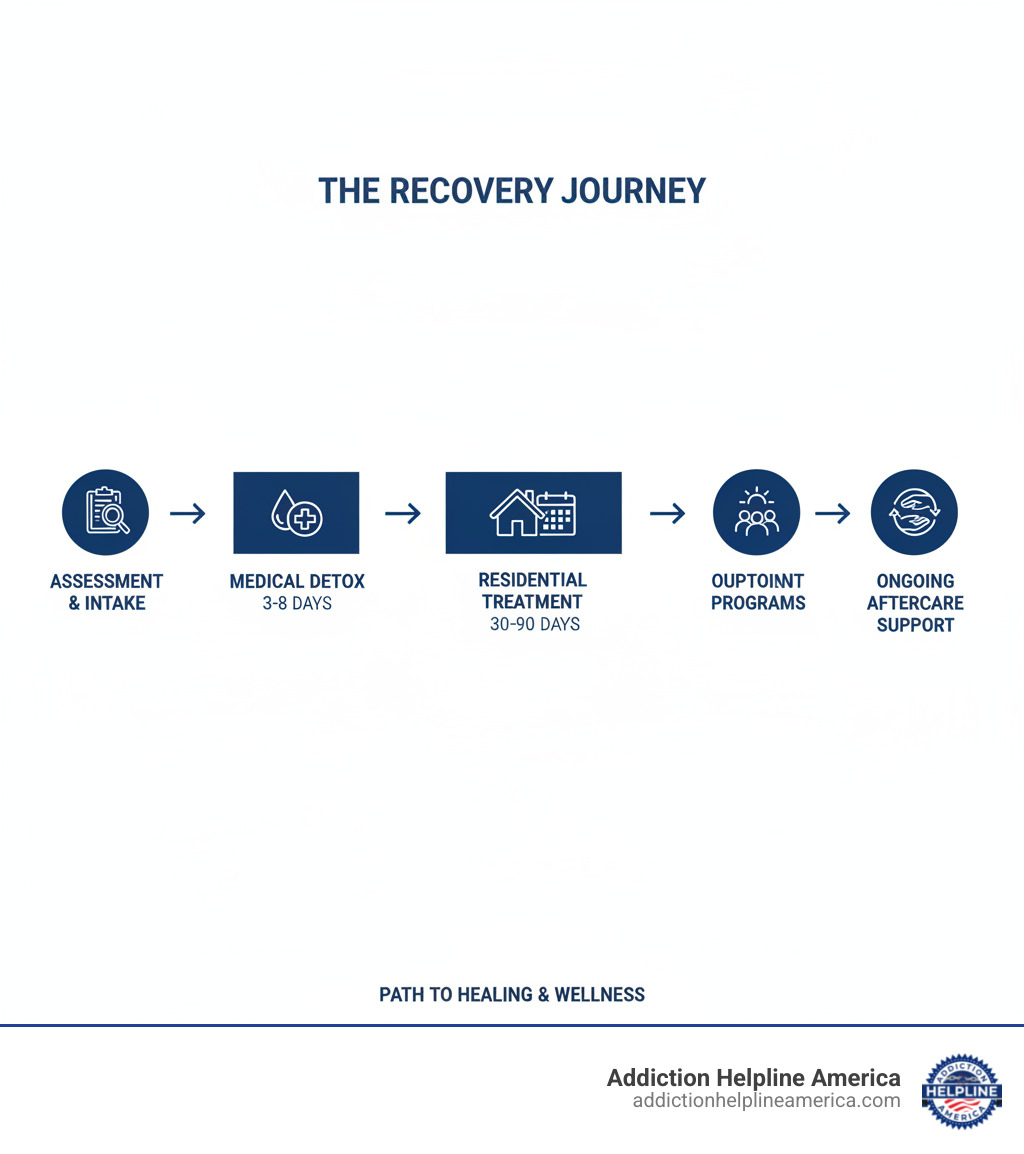
Why Drug Detox Facilities Are Your First Step to Recovery
Drug detox facilities provide medically supervised withdrawal management and are the critical first step in overcoming substance use disorder. These specialized treatment centers offer 24/7 medical care, medication-assisted treatment, and symptom management to safely guide individuals through the withdrawal process.
What You Need to Know About Drug Detox Facilities:
- Purpose: To clear substances from your body while managing potentially dangerous withdrawal symptoms under medical supervision.
- Duration: Most detox programs last 3-8 days on average, though this varies by substance and individual.
- Types Available: Inpatient/residential (24/7 care), outpatient (live at home), and specialized programs (dual-diagnosis, holistic).
- Cost Range: From free state-funded options to private facilities; most insurance plans now cover addiction treatment under the Affordable Care Act.
Statistics show that 46.3 million Americans aged 12 or older had a substance use disorder in 2023, yet only a fraction receive treatment. For many, professional detox is life-saving, as withdrawal from substances like alcohol and benzodiazepines can be fatal without medical supervision.
Choosing the right drug detox facility can feel overwhelming. This guide breaks down what detox involves, the types of programs available, and how to pay for treatment so you can make an informed decision.
Addiction Helpline America has connected thousands of individuals with appropriate drug detox facilities. Our team of addiction specialists understands that finding the right detox facility is the crucial first step toward lasting recovery.

Key drug detox facilities vocabulary:
Understanding Drug Detox: The Foundation for Recovery
Drug detoxification—detox for short—is the medical process of safely removing substances from your body while managing withdrawal symptoms. It’s not just about getting clean; it’s about protecting your health and setting you up for lasting recovery.
What is Drug Detox and Why is it Necessary?
Think of detox as the bridge from active addiction to real recovery. When you use drugs or alcohol regularly, your body adapts. If you stop suddenly, your system goes into shock, causing withdrawal symptoms that can range from uncomfortable to deadly.
Drug detox facilities provide the medical supervision needed during this critical time. Trained professionals offer 24/7 monitoring, manage withdrawal symptoms safely, and use medications when appropriate. This process clears substances from your system and stabilizes your body, making you physically and mentally ready for the therapeutic work that follows. Without this foundation, engaging in counseling is like building a house on quicksand. You can learn more in our Detox Facility Ultimate Guide.
Signs You or a Loved One Needs Professional Detox
Recognizing the need for professional help is the first step. Certain signs indicate that trying to quit alone could be dangerous.
- Physical dependence: If stopping use causes shakes, sweating, nausea, or other intense physical reactions, you need medical supervision.
- Inability to stop: You’ve tried to quit before but couldn’t, despite genuinely wanting to.
- Intense cravings: Your thoughts are consumed by cravings for the substance.
- Neglecting responsibilities: Substance use is interfering with work, school, or family life.
- Declining health: Your mental or physical health is worsening due to substance use.
Withdrawal symptoms vary by substance. Opioid withdrawal can cause muscle aches and agitation. Alcohol withdrawal can bring tremors, anxiety, and potentially fatal seizures. Stimulant withdrawal often leads to exhaustion, depression, and overwhelming cravings.
Call Now – Your Journey to Recovery Begins Today!

Take the first step towards a healthier life! Call now to connect with our compassionate team and start your recovery journey today. Your path to healing awaits!
Our recovery specialists are available 24/7 to provide support, and all calls are confidential and free. Reach out anytime – we’re here to help!
The Detox Process: What to Expect
Knowing what happens at a drug detox facility can ease anxiety. The journey begins with an initial assessment, where staff learn about your substance use history and health to create a safe plan.
Next is a medical evaluation, including physical exams and lab tests, to help the team anticipate complications. Then, the withdrawal phase begins. As your body eliminates the substance, medical staff monitor you continuously, providing medications and interventions to keep you comfortable and safe. Symptom management is the top priority.
The average duration for detox is 3 to 8 days, but this varies based on the substance, duration of use, and your personal health. Your treatment team will adjust the plan based on your response. For example, heroin detox often follows a specific timeline, which you can read about at How Long Does It Take to Detox From Heroin?.
The Role of Medication in a Safe Detox
Modern medical detox has transformed withdrawal into a manageable process. Medications don’t just provide comfort—they can save your life.
Medication-Assisted Treatment (MAT) is a cornerstone of opioid addiction treatment. Medications like buprenorphine (Suboxone) reduce opioid withdrawal symptoms and cravings, making the process much more tolerable. Understanding Suboxone Withdrawal Symptoms can help you prepare for the future.
For alcohol withdrawal, benzodiazepines are often used to prevent life-threatening seizures and calm an overactive nervous system. These medications are prescribed and monitored by licensed medical professionals who adjust dosages based on your needs. The goal is to provide symptom relief and stability so your body can heal, preparing you for long-term recovery.
Types of Drug Detox Programs
Not all drug detox facilities are the same. Different people need different levels of care depending on the severity of their addiction, the substances used, and their home support system. Understanding your options helps you make the best choice for yourself or a loved one.

Inpatient and Residential Detox
Inpatient and residential detox programs offer the most intensive level of care. At these drug detox facilities, you live on-site and receive 24/7 medical supervision. This constant monitoring is crucial for those with severe addiction, a history of dangerous withdrawal, or co-occurring medical or mental health issues.
The structured environment removes you from daily triggers, allowing you to focus solely on getting well. This focused approach often leads to higher success rates for initial sobriety. Many facilities provide comfortable settings that feel more like a healing retreat than a hospital, ensuring you are as comfortable as possible. Learn more about inpatient detox to see if this level of care is right for you.
Outpatient Detox Programs
Outpatient detox allows you to live at home while attending regular appointments at a drug detox facility. Healthcare professionals monitor your progress, manage medications, and provide support during these check-ins.
This option is suitable for individuals with mild to moderate substance use disorders and a stable, supportive home environment. The main advantage is flexibility, as you can often continue with work, school, or family duties. However, outpatient detox requires significant personal discipline since you are not in a constantly supervised setting.
Specialized Detox Services
Many drug detox facilities offer specialized programs to meet specific needs, which can greatly improve the effectiveness of your detox experience.
- Holistic detox programs incorporate practices like yoga, meditation, and nutritional counseling to support your body, mind, and spirit.
- Dual-diagnosis programs are vital for those with both an addiction and a mental health condition like depression or anxiety, treating both issues simultaneously.
- Gender-specific programs for men or women provide safe spaces to focus on recovery with peers who share similar life experiences.
- Programs for professionals offer discreet treatment for those in high-responsibility careers who face unique pressures.
Explore specialized detox options to find a program that addresses your specific situation. The right approach can be the foundation for lasting change.
Key Factors for Choosing Quality Drug Detox Facilities
Choosing the right drug detox facility is a critical decision. There are clear markers of quality that can guide you toward a center that provides safe, effective care. Use this as a checklist to help you make an informed choice.
Accreditation and Licensing
Before committing to any facility, verify its credentials. This ensures the center meets established standards for safety and quality of care. Look for accreditation from respected independent organizations like The Joint Commission (JCAHO) or the Commission on Accreditation of Rehabilitation Facilities (CARF). These credentials mean a facility has passed rigorous evaluations of its patient care and safety protocols.
In addition, ensure the facility has state licensure from its local health or substance abuse agency. This confirms compliance with state-specific regulations on everything from staff qualifications to safety standards. Reputable facilities typically display their accreditations on their websites, or you can call and ask them directly.
Evidence-Based Treatment and Staff Qualifications
The best drug detox facilities use evidence-based treatments—approaches proven effective through scientific research. A key sign of quality is the creation of individualized treatment plans. Since everyone’s journey is unique, a plan custom to your specific history and health needs is far more effective than a one-size-fits-all approach.
Look for programs that use therapies like Cognitive-Behavioral Therapy (CBT) to help change negative thought patterns. Of course, medically-supervised withdrawal is the cornerstone of safe detox, using medications to manage symptoms and prevent complications.
The people providing care are just as important. A quality facility will be staffed by licensed medical professionals, including doctors and nurses with specific training in addiction medicine. A good patient-to-staff ratio is also important, as it ensures you receive personalized attention when you need it most.
Comparing Different Types of Drug Detox Facilities
Understanding the differences between facilities helps you find the right fit for your needs and budget.
State-funded facilities provide essential services at little to no cost for eligible individuals. They offer core medical detox and counseling with functional amenities. Because they are a vital public resource, there may be waiting lists.
Private facilities often have shorter wait times and operate more like specialized healthcare centers. They typically provide more comfortable or even luxurious environments, with amenities like private rooms and a wider range of therapies. This comes at a higher cost, which can be covered by insurance or private payment.
Neither option is inherently better. The right choice depends on your specific needs, resources, and what kind of environment you feel will best support your recovery. For insights into options in specific areas, our Detox California guide can help.
Call Now – Your Journey to Recovery Begins Today!

Take the first step towards a healthier life! Call now to connect with our compassionate team and start your recovery journey today. Your path to healing awaits!
Our recovery specialists are available 24/7 to provide support, and all calls are confidential and free. Reach out anytime – we’re here to help!
Aftercare Planning and Continuum of Care
Detox is the first step, not a cure for addiction. Recovery is a lifelong journey. A quality drug detox facility emphasizes aftercare planning from the very beginning.
Your treatment team should work with you to plan your next step, which could be a transition to residential rehab, an outpatient program, or a sober living house. These programs provide the structure and therapy needed to build a foundation for long-term sobriety.
Effective facilities also teach relapse prevention strategies—practical tools for identifying triggers and developing healthy coping mechanisms. Many also offer alumni programs to keep you connected to a supportive community long after you leave. The goal of aftercare is to ensure you have a strong support system in place, as the facility’s responsibility doesn’t end when detox does.
Navigating Costs and Finding a Facility Near You
Cost should not be a barrier to life-saving treatment. This section covers payment options and resources for locating help.

Understanding the Cost of Detox
The cost of drug detox varies based on several factors. Understanding these can help you find an option that fits your situation.
- Program Type: Inpatient detox with 24/7 supervision costs more than outpatient programs where you live at home.
- Location and Amenities: Facilities in major cities or with luxury amenities like private rooms, gourmet meals, and holistic therapies will have higher price tags.
- Services Included: Some programs bundle all costs, while others charge for services like medication separately. Always ask for a detailed breakdown.
While the price can seem daunting, treatment is an investment in your life, and many resources exist to make it affordable.
Payment Options: Insurance, Medicaid, and More
Paying for detox is more accessible than many people realize. The Affordable Care Act (ACA) requires most health insurance plans to cover substance use disorder treatment. Your private insurance likely covers at least a portion of detox costs. The key is to verify your insurance benefits with your provider or the facility’s admissions team before starting treatment.
Medicaid and Medicare also provide crucial coverage for low-income individuals, the elderly, or those with certain disabilities. Many reputable drug detox facilities accept these government-funded plans.
Other options include:
- Sliding scale fees, where facilities adjust the cost based on your income.
- Private financing and payment plans that allow you to pay over time.
- COBRA benefits to extend your health insurance after losing a job.
- VA benefits for veterans and active military personnel.
Don’t let cost fears stop you from making that first call. Treatment is available at every price point.
How to Find Reputable Drug Detox Facilities Near You
When you’re ready to find help, you need trustworthy resources that connect you with quality care quickly.
Addiction Helpline America specializes in connecting people to appropriate treatment centers nationwide. Our team offers free, confidential, and personalized guidance to help you find the right recovery program from our extensive network of trusted facilities. We take the time to understand your unique needs, insurance coverage, and circumstances to find the perfect match.
You can also search the federal treatment locator at FindTreatment.gov for up-to-date, verified programs, and use SAMHSA’s 24/7 resource National Helpline for information and referrals.
Your physician or a trusted medical professional can also be a valuable resource. They may have knowledge of reputable detox facilities in your area and can provide recommendations based on your health needs.
When researching facilities, always verify their credentials. Confirm their state licensing and ask about accreditation from organizations like The Joint Commission or CARF. A quality facility will welcome your questions and provide transparent answers. Our Detox Near Me Guide provides additional resources for finding local help.
Conclusion
Taking the first step toward recovery requires courage, and now you have the knowledge to move forward with confidence. We’ve shown that drug detox facilities provide the essential, medically supervised start to your recovery journey, keeping you safe and stable during a vulnerable time.
You’ve learned about the different types of programs, from 24/7 inpatient care to flexible outpatient options, and the importance of choosing a quality facility with proper accreditation, evidence-based treatment, and strong aftercare planning.
We’ve also shown that cost doesn’t have to be a barrier. With options like insurance, Medicaid, and payment plans, a path forward is available for every financial situation.
The statistics are sobering, with millions of Americans struggling and hundreds of lives lost to overdose each day. But your story doesn’t have to be a statistic. Recovery is possible, and it starts with reaching out for help.
Navigating your options can feel overwhelming, especially in a crisis. You don’t have to do it alone. Addiction Helpline America exists to lighten that burden. Our team provides free, confidential guidance, connecting you with a treatment program from our trusted network that fits your unique needs.
Your life, or the life of someone you love, is worth fighting for. Recovery begins with a single phone call.
Get help now by calling our addiction and rehab hotlines.
Our helpline is 100%
free & confidential
If you or someone you care about is struggling with drug or alcohol addiction, we can help you explore your recovery options. Don’t face this challenge alone—seek support from us.
Programs
Resources
Will my insurance
cover addiction
treatment?
We're ready to help
Find the best
drug or alcohol treatment
center
Are you or a loved one struggling with addiction? Call today to speak to a treatment expert.






